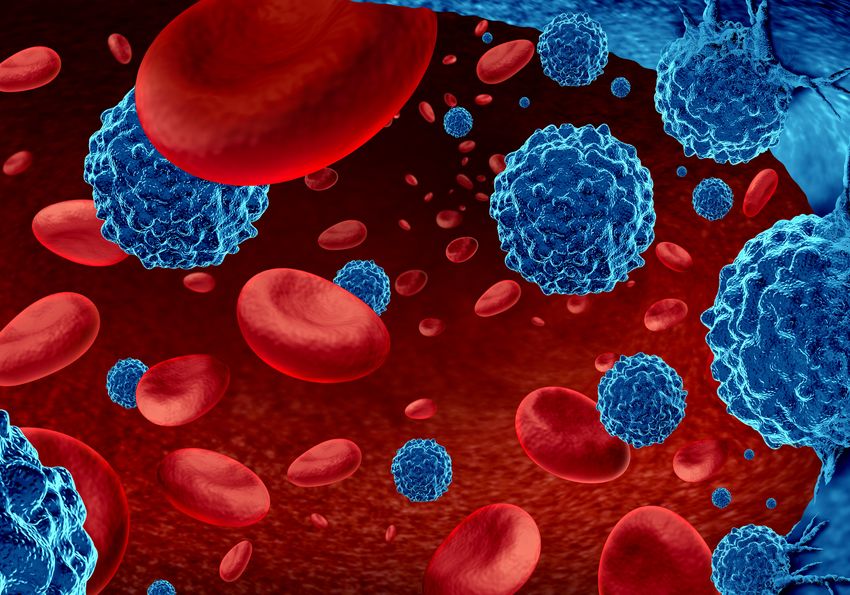Acute leukemia arises from genetic alterations within hematopoietic cells, which lead to unregulated cellular proliferation. Scientists have detected rearrangements of the lysine methyltransferase 2A (KMT2A) gene in adults and children diagnosed with acute myeloid leukemia (AML) and acute lymphoblastic leukemia (ALL). The majority of these patients experience relapse after receiving conventional frontline therapies, and they often exhibit drug resistance and poor prognosis.

Nick Botwood, MBBS
Head of Research and Development
Chief Medical Officer
Syndax Pharmaceuticals
In this Innovation Spotlight, Nick Botwood, head of research and development and the chief medical officer at Syndax Pharmaceuticals, discusses the current landscape of AML and ALL treatment, the mechanism of action for revumenib, the first and only US Food and Drug Administration (FDA)-approved menin inhibitor, and the ongoing clinical trials advancing the development of this promising new approach.
What is the current landscape for AML and ALL treatment?
AML and ALL are aggressive, life-threatening forms of blood cancer. Intensive chemotherapy remains the standard of care treatment for many patients, with the goal of bringing patients into remission so that they can receive a stem cell transplant. This is the only potentially curative treatment option available today.
In the last decade, scientists have developed several new therapies for certain subsets of AML patients, such as venetoclax and targeted drugs for patients with FLT3, IDH1, or IDH2 mutations. Despite recent advancements, long-term outcomes remain poor for many patients. Syndax has delivered the most recent advancement with the approval in 2024 of revumenib, the first menin inhibitor.
What is menin and how does menin inhibition work?
Menin is a scaffold protein that plays an important role in gene regulation and certain types of acute leukemias. Menin inhibitors work by disrupting the interaction between menin and other proteins, which drive the growth of leukemia cells in people with certain genetic alterations.
Scientists evaluated menin inhibition in patients with acute leukemia who had several different genetic alterations, including KMT2A rearrangements (KMT2Ar), NPM1 mutations (mNPM1), and NUP98 rearrangements (NUP98r), and obtained promising results in areas with major unmet needs.1,2 KMT2A rearrangements are observed in patients of all ages but occur more frequently in infants and children. For example, this rearrangement is found in approximately 80 percent of infants with ALL, the most common type of childhood leukemia. This underscores the tremendous need for therapies that target this specific form of cancer. Overall, we estimate that there are about 15,000 acute leukemia patients in the US with a genetic alteration driving their cancer that may be dependent on the interaction between menin and certain proteins.
How does menin inhibition differ from conventional treatment approaches for AML or ALL?
In acute leukemia, abnormal leukemia cells multiply very quickly and take over the space in the bone marrow. This blocks the cells in the bone marrow from differentiating into the normal blood cells that play many crucial roles in our health. Menin inhibitors target the protein-protein interactions that drive leukemic cell growth in patients with certain types of genetic alterations. Cytotoxic chemotherapy, the conventional treatment approach for AML and ALL, can broadly kill all types of cells, including both cancerous and healthy cells.
What discoveries paved the way for the emergence of menin inhibition as a new therapeutic approach, and where is the field now?
Syndax’s work builds on landmark preclinical research that established the role of menin in certain forms of difficult-to-treat acute leukemias.3 In preclinical models, researchers were able to show that disrupting the interaction of menin with KMT2A could cause cells to lose their cancerous qualities. This discovery subsequently led to the development of revumenib, a small molecule that fits into the binding pocket of menin and displaces KMT2A.
In 2020, Syndax delivered the first data in humans that validated the therapeutic potential of menin inhibition and, from there, has continued to rapidly advance the development of this promising new approach. Our pivotal AUGMENT-101 trial of revumenib led to the FDA approval in 2024 of the first menin inhibitor for relapsed or refractory (R/R) acute leukemia with a KMT2A translocation.
What are the next steps for Syndax in terms of advancing your menin inhibition clinical programs?
Based on the positive pivotal data from our AUGMENT-101 trial of revumenib, Syndax recently submitted a supplemental New Drug Application for the treatment of R/R mNPM1 AML, another difficult-to-treat form of acute leukemia with a poor prognosis. Additionally, we are studying revumenib in different patient populations and have observed encouraging results with it as a single agent and in combination with other therapies. Building on the results we have shown in patients with R/R acute leukemias, we, along with our clinical collaborators, have multiple ongoing and planned trials that will study revumenib in combination with standard-of-care therapies in earlier lines of treatment. We aim to demonstrate that earlier treatment and the use of combination therapies can improve outcomes.

Menin inhibition can potentially treat adults and pediatric patients with relapsed or refractory acute leukemia harboring a KMT2A translocation.
iStock, wildpixel
In your opinion, what is the most promising aspect of the future of menin inhibition?
What excites me and our entire Syndax team is the potential for menin inhibition to transform the treatment paradigm for patients fighting life-threatening forms of acute leukemia. If you consider AML, the most common form of acute leukemia in adults, we estimate that up to 50 percent of patients have a genetic alteration that may make their cancer susceptible to menin inhibition. This highlights the significant opportunity we have to make a major impact on patients and their loved ones through our work pioneering the development of this new class of therapeutics.
What other areas is Syndax working on?
In addition to pioneering the development of menin inhibition, we are equally excited about the work advancing axatilimab, a monoclonal antibody that targets the colony-stimulating factor-1 receptor (CSF-1R). CSF-1R is a cell surface protein thought to control the survival and function of monocytes and macrophages. In preclinical studies, inhibition of signaling through CSF-1R reduced the number of disease-mediating macrophages along with their monocyte precursors. These cells play a key role in the fibrotic process underlying chronic graft-versus-host disease (GVHD) and other diseases, such as idiopathic pulmonary fibrosis (IPF).
Following a successful pivotal trial, axatilimab became the first FDA-approved CSF-1R-blocking antibody for the treatment of chronic GVHD after failure of at least two prior lines of systemic therapy.4 Chronic GVHD is a debilitating and difficult-to-treat disease that can occur after an allogeneic stem cell transplant and can last for years. In chronic GVHD, the donated cells initiate an immune response and attack the transplant recipient’s organs, which can cause significant morbidity and mortality. This is an area of high unmet need, as many patients cycle through different therapies without achieving relief from their symptoms.
Building on the compelling results seen with CSF-1R inhibition in patients with chronic GVHD who have failed prior lines of therapy, researchers are currently assessing axatilimab in patients with newly diagnosed chronic GVHD and IPF. We believe that we have just started to scratch the surface of the opportunities to make an impact for patients with both axatilimab and revumenib.
- Issa CG, et al. Menin inhibition with revumenib for KMT2A-rearranged relapsed or refractory acute leukemia (AUGMENT-101). J Clin Oncol. 2024;43,75-84.
- Arellano LM, et al. Menin inhibition with revumenib for NPM1-mutated relapsed or refractory acute myeloid leukemia: the AUGMENT-101 study. Blood. 2025;2025028357.
- Krivtsov AV, et al. A menin-MLL inhibitor induces specific chromatin changes and eradicates disease in models of MLL-rearranged leukemia. Cancer Cell. 2019;36(6):660-673.e11.
- Wolff D, et al. Axatilimab in recurrent or refractory chronic graft-versus-host disease. N Engl J Med. 2024;19;391(11):1002-1014.













